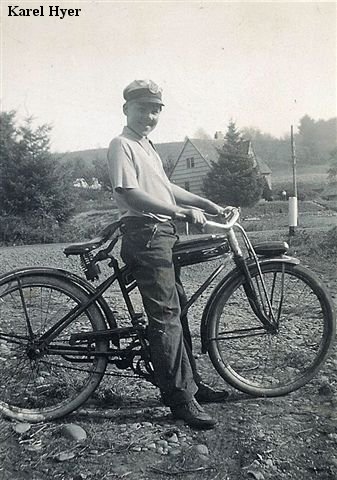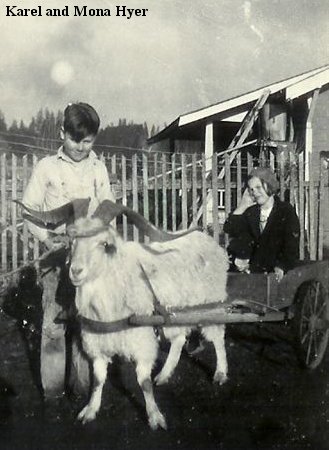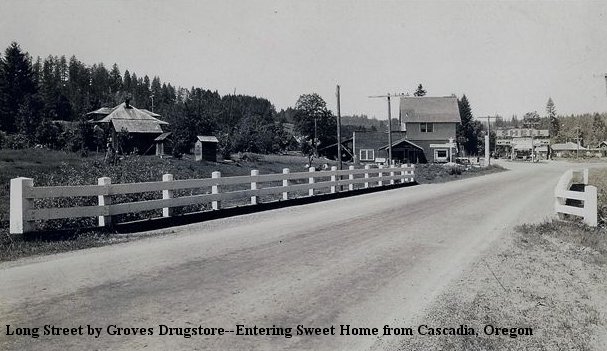SIMPLE THINGS
by
Mona Hyer Waibel
All photos are from the personal collection of Mona Hyer Waibel.
Use of them for commercial purposes is prohibited without her permission
.![]()
The world was a different place during the 1930’s.
We always knew our neighbors well and we took care of each other when any neighbor had problems. If their barn burned, we helped build another. If we had extra food, we shared – and maybe gave some when it was badly needed at our house.
Bob and Adella Gabriel were our closest neighbors and their six children Bob Jr., Bill, Gerry, Keith, Barbara and Beverly became our best friends. Even when we all moved into town again, it was the Gabriel family we enjoyed the most. This was a lifetime friendship and one I still cherish.
Not many people had bank accounts during the Depression. If we happened to have cash, we kept it in a sugar bowl in the kitchen cupboard and it was always safe there. No one ever locked their doors; what was there worth stealing? And people were very honest too. Lawyers weren’t needed to do legal documents; we had gentleman’s handshakes that meant you did what you promised. Most people were down-to-earth and very trustworthy. Sale of properties usually required yearly payments to the bank. Banks were involved in property exchanges, and foreclosures.
Our clothes closets, if we had any, were very small. Usually two changes of clothes were all you had. The best one was worn on Sunday for church. Men wore dark double-breasted suits with wide ties; and women wore their best dresses. We didn’t have clothes hangers; we had hooks in the wall that worked just fine. The old Singer sewing machine usually made everyone’s dresses, but not at our house because Mother was always working.
My dad’s rain mackinaw and his hats hung on the back porch to be handy for quick dashes to the barn or out to the corral.
Yes, we had some kind of barn for our milk cow and a team of horses. And my faithful goat hung around the barn too. It was the queen of everything and no one messed around with my milk goat or you got butted from behind. The goat had a nice wagon that my brothers hooked up for me to take a ride. My brothers were mostly good to me and took care of me when Mother asked. Or so she thought!
The farm we had in Pleasant Valley had a bigger barn than we had before. And it was a fine place to play in when it was pouring down rain. Bales of hay were fun to jump on and sometimes, when the hay wagon sat in front of the barn, we would go to the loft and jump out the high window into the hay. I was a little afraid of heights so I just watched.
Of course the sheep didn’t get into the barn; there was an unwritten law that smelly sheep and cattle did not share the same space. Sometimes a rattler paid a visit too. Our Dad shot one that seemed to lazily sun itself on our front porch.
Our well water was sweet and deep and was quite cold in the dipper that hung by our well. Our well never ran dry, as the Santiam River was near by. We also had a watering trough that was used for pigs and other livestock. My great-grandfather John Thompson liked having pigs and he shared them with family members.
My brother Tom always milked the cows, except for the one that had her calf. Having our own milk was important for my family. Everyone tried to raise what we needed to eat. Sugar and salt were something we had to buy. Honey could take the place of real sugar but salt, we couldn’t live without. And, of course, salt licks for farm animals sat right beside the watering trough. We bought them at the Sweet Home feed store.
Our farm was near the old Indian camps and the plow did dig up some interesting items, a few mortars and pestles for grinding the Indians’ grain. The Kalapuya Indians had camped everywhere in this part of the county, and they left an impression with all of us.
Besides the outhouse that the whole family used for doing what comes naturally, my Dad had a covered chamber pot that sat under the bed. I imagine he had some kind of urinary infection, but back then we never heard of this problem. Mother always took care of emptying this smelly pot.
Getting sick meant the doctor came to your house and took care of you. Dr. Langmack was that kind of physician and he was greatly beloved. One time, when I was 5 years old, I was very sick with an ear infection. Mother put me to bed with a hot water bottle, and that was the wrong thing to do for a mastoid infection. Heat brings things to a head and I needed surgery. Dr. Langmack drove us to Eugene and surgeons there did surgery late that night as I was so ill. There were actually two sick children and the boy did not get there in time for the surgery. He died the next morning.
But Doctor Langmack knew my surgery was needed. This was before the days of electric motors and so they cut through my skull manually, and even today I still remember that sound as the skull crunched from the device. The mastoid was removed. We didn’t have any money. When it was all over and the Eugene surgeons finished, it was Doctor Langmack who cared for me for the next three weeks.
Only then did he present the bill: Two apples pies, two skinned rabbits and one plucked chicken. Mother took care of that bill and was grateful to this fine caring Doctor Langmack.
Going to school was a fun thing and we never
wanted to miss a single day. My brothers
Jim, Tom, and Karel Hyer were good students and when I began school it was my
oldest brother Jim Hyer who helped me understand my school work. Jim became a well known science teacher in
the Eugene school systems.
Tom was always the popular, easy going brother. Karel helped me with spelling
when I entered the Spelling Bee at school.

Karel had a brilliant mind, a photographic memory that could recite just about anything he had read. Schools were always the heart of the community and we took part in Christmas programs, and sang with our hearts too. It was OK then to sing religious songs and we all did. And every morning, we did the Pledge of Allegiance and sang “Oregon, My Oregon.”
Life wasn’t all play. As children we learned to work hard to help Mother and our stepfather, Floyd Bryant, keep food on the table and clothes on our back. Tending a garden was something we all took part in, and feeding the livestock too. No, I didn’t really help much then. I wasn’t very old when we lived on the Haywire ranch. But I did help in the kitchen with Mother baking bread and churning butter and the other hundreds of things she had to do.
We grew pole beans and let the pods dry up on the string; then opened the beans and shelled them. Cooking some of the fresh dried shellies were really tasty with a big piece of fat bacon for seasoning. And in the winter we had dried beans hanging in an old feed sack staying dry and just ready for good eating. Many families had a pot of beans at least once a week with maybe some tasty cornbread too. Our Mom liked to cook rice to pour the beans over for a very filling meal that we all liked. When she made some real spicy chili beans, the rice cut that hot chili down and made my mouth quit burning. Mother cooked beans with garlic and onions and several of these seasonings were hanging in our kitchen.
Floyd Bryant farmed and lost his shirt; he spent his military bonus on a sizable herd of sheep. The sheep died, one by one and the 72-acre farm full of fertile river-bottom fields and a good crop of alfalfa was under bank foreclosure. During the Depression, there were many stories like ours. Then we moved back to our 4 1/2- acre place in Sweet Home. The folks bought a restaurant in town and Mother did the cooking there and it was quite a success. Those years, everyone worked hard to make a living. Life gave you everything that you needed, even a new dad when ours died.
It was a time for “rocking chairs.” When you were unemployed, you drew money for that, and we called it “rocking chair money”. When some became older, they were “Rocking Alone in an Old Rocking Chair”, one of the songs Jim sang and played on his guitar, along with “That Silver Haired Daddy of Mine.” And every front porch had a rocking chair sitting on it. Guess that about covers it, unless someone was “off their rocker.” And that of course meant they were “tetched” in the head!
Kids are always getting hurt. And one of the things that add to our daily life is having children and their ability for accidents. Jim, being the oldest, found simple ways to put us all through living hell.
A glass of clear liquid sitting in the kitchen window sill tempted Jim and he downed it when he was thirsty. Actually, the glass was filled with a lye concoction to clean out the drain in the sink. Instead it cleaned out Jim’s stomach.
Football was hard on his extremities too. He broke his arm severely, and good Dr. Langmack came to the rescue again. Come to think of it, Sweet Home High School football was hard on all three brothers.
Tom, being the copy-cat of Jim, couldn’t be outclassed and he fell out of a tree and did some bad stuff to his body. Tom ended up in the hospital where he met his first black person, and was excited about that. I’m not sure what the bill was for that hospital stay - probably not as much as my costs.
Tom was daring and he decided to show us all how great a horseman he was. He took our horse, rode it very fast downhill and the poor nag burst an artery in its neck and fell over dead. Kids and disasters are always happening.
Karel, being the youngest boy had both Jim and Tom to one- up, and so of course he topped them both with freaky accidents. He was inclined to overeat and actually burst his appendix at the school picnic - and another Langmack hospital surgery to pay for. He also did a great trick on his new bicycle. He always saw double and when he came to the bridge he tried to drive between the two bridges. The new bike was a wreck, and Doctor Langmack wouldn’t fix this. The boys needed their bike for paper routes, so our Dad worked for several weeks to straighten and pound it all out. But it was never the same again.
Karel loved playing baseball and he was
the catcher. Lyle Menear swung at a
ball, let go of the bat and knocked out most of Karel’s front teeth. But then
Dr. Langmack came quickly with his doctoring bag and helped Karel out. I don’t know how Mother stayed so
calm!
Now you might think I was a dainty female, but this tomboy always said “Anything you can do, I can do better.” My brothers were not appreciative of my company and told me not to follow them around, and they threw a brick at me to show me they meant it. The brick cracked my skull. I did like school but found a way to get two weeks off: falling down a flight of stairs and ending up with another skull fracture, concussions etc. It was a nuisance to miss important baseball games.
Learning to ride a bike can be hazardous too; someone should have informed me about how to use the brakes before the first crash. I sailed right off the end of Ames Creek Bridge doing at least 60 miles an hour. And my brothers just kept laughing! But I do remember that when the three boys were scuffling at bedtime, one tossed a shoe at Karel and it broke his nose. Now who got the last laugh then! Me! They got in big trouble then and had to wash the bloodstains out of the flannel sheets with cold water.
Brothers can be so inventive. When Mother asked the three boys to watch their little sister, they came up with a real fun thing to do. They let the air out of the Whippet car tires and took me, little Ramona, for an interesting drive up and down the railroad tracks. Inventive, all right; they might have found a way to eliminate their worries permanently if a train had come along about then. Mother tried not to get too upset because she knew there would be adventures from these three boys or maybe even me, in the days to come.
Dinner times were special and all the family ate together. My Dad had a ritual. Every night after supper he rocked in his old squeaky wooden platform rocker and I crawled onto his lap while he puffed away on his corncob pipe. He wore stained bib overalls that smelled like pitch. It didn’t take long for the sandman to send me into a deep sleep.
Mother had the flat iron on the heater waiting and she wrapped it and put it at the foot of my otherwise cold bed. They carefully tucked me into my tiny bed for the night and also for all my life with their devotion. These are very fond memories. Life was very simple and my life was a contented one.
![]()
My name is Stephenie Flora. Thanks for stopping by. Return to [ Home Page ] All [ Comments and Inquiries ] are welcome.
